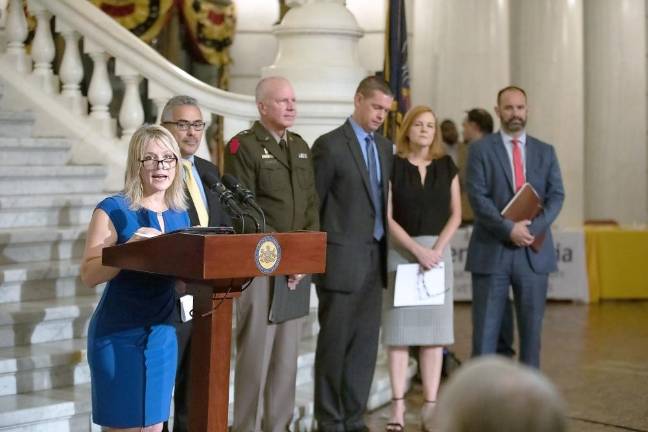Wolf Administration recognizes suicide prevention awareness month, discusses multi-disciplinary approach
Mental Health. Pennsylvania officials from various sectors gathered to provide information about the state’s multi-disciplinary approach to suicide prevention.

Leadership from multiple state agencies joined advocates from Prevent Suicide PA last week to recognize September as Suicide Prevention Awareness Month and present information about work to embed suicide prevention efforts across systems.
”So many Pennsylvanians of all ages, backgrounds, and identities live with mental health issues or experience times of personal crisis that leave them feeling isolated, alone, and hesitant to seek help for a variety of reasons. These are real people - our friends, neighbors, acquaintances and ourselves,” said Human Services Deputy Secretary for Mental Health and Substance Abuse Services Kristen Houser. “We’re here today to tell you that you are not alone, and no matter what it is you are facing, your experiences are valid, and you do not have to carry the weight of these situations by yourself. Free, caring, and confidential help is available, and using these resources can save lives.”
Approximately 1.2 million adults attempt suicide annually in the United States, with more than 85 percent reporting having made a suicide plan prior to their attempt. In 2020, the most recent year that data is available, approximately 1,700 people died by suicide in Pennsylvania.
In 2019, the Wolf Administration announced the formation of a statewide Suicide Prevention Task Force comprised of leadership from Prevent Suicide PA, members of the General Assembly, and representatives from more than 10 state agencies covering health and human services, public safety, education, and veteran’s affairs, among others. Because suicide is so far-reaching, this diverse array of subject matters and expertise is necessary to build a comprehensive, multi-disciplinary awareness and focus on embedding suicide prevention wherever possible.
In addition to 988, many other resources also remain available to Pennsylvanians in need of support, including:
• Crisis Text Line: Text “PA” to 741-741
• Veteran Crisis Line: 1-800-273-TALK (8255)
• Disaster Distress Helpline: 1-800-985-5990
• Get Help Now Hotline (for substance use disorders): 1-800-662-4357
• Pennsylvania Sexual Assault Helpline: 1-888-772-7227 or https://pcar.org/help-in-pa
• National Domestic Violence Helpline: 1-800-799-7233 or www.PCADV.org
Additionally, the challenges of COVID-19, uncertain economic climate, and increased inflation may still create challenges for individuals and families who are trying to make ends meet. When people struggle to access essential needs, this can create more stress and anxiety, and resources are available in your community to help you meet these needs. The United Way of Pennsylvania can help connect you to these resources. Text your zip code to 898-211 to be connected to programs and resources in your community or visit https://www.uwp.org/. People in need of assistance can also visit www.dhs.pa.gov/compass to learn more, apply for assistance programs and connect to local programs that can help with health care, food, housing and utility bills, plus other needs.
To learn more about mental health and crisis supports in Pennsylvania, visit www.dhs.pa.gov/mentalhealthinpa.
Approximately 1.2 million adults attempt suicide annually in the United States, with more than 85 percent reporting having made a suicide plan prior to their attempt. In 2020, the most recent year that data is available, approximately 1,7